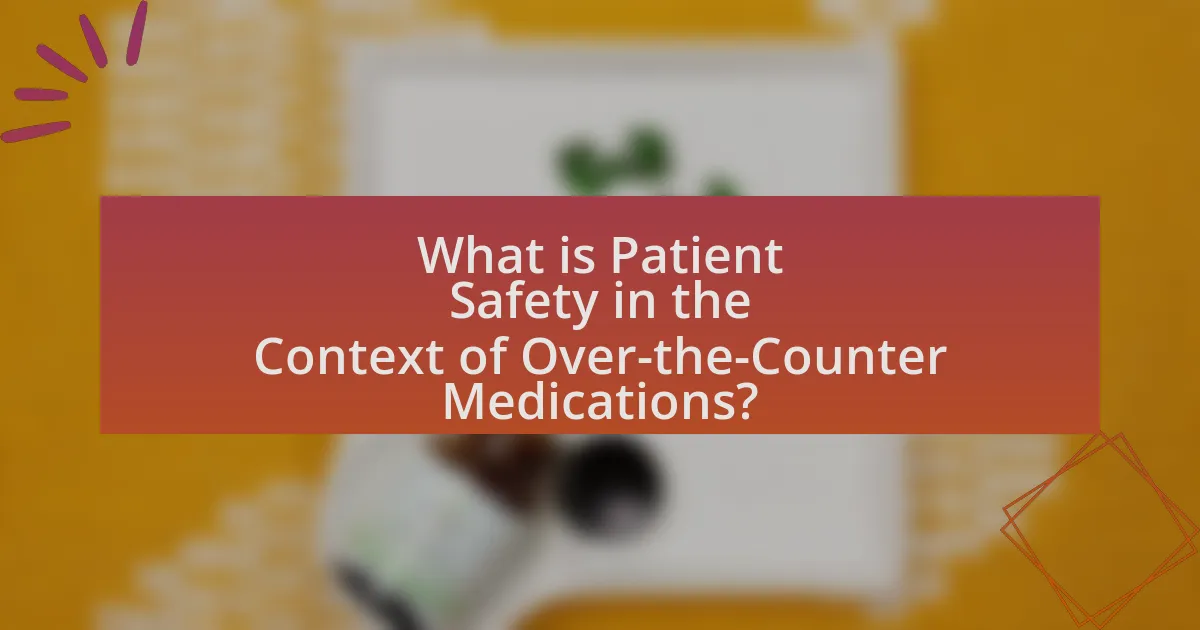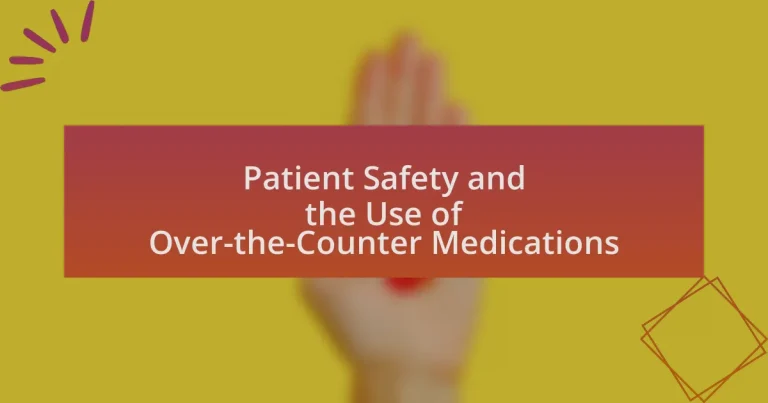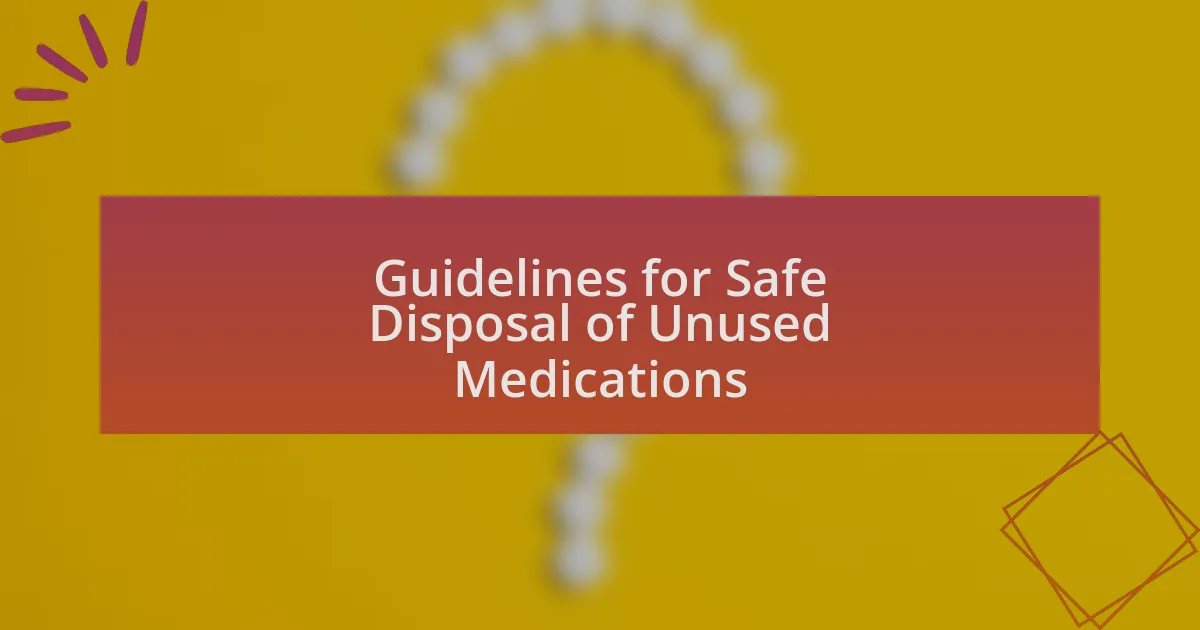Patient safety in the context of over-the-counter (OTC) medications is essential for preventing harm to consumers who self-medicate. This article examines the importance of patient safety, highlighting the risks associated with improper use, such as adverse drug reactions and interactions with prescription medications. It discusses the critical role healthcare professionals, particularly pharmacists, play in educating patients about safe medication practices and the regulatory measures in place to ensure OTC medications are safe and effective. Additionally, the article provides guidance for patients on how to use OTC medications safely, recognize adverse reactions, and avoid common mistakes, emphasizing the need for informed decision-making in self-medication.
What is Patient Safety in the Context of Over-the-Counter Medications?

Patient safety in the context of over-the-counter medications refers to the prevention of harm to patients when using these easily accessible drugs. This includes ensuring that consumers are informed about the correct usage, potential side effects, interactions with other medications, and the importance of adhering to recommended dosages. According to the U.S. Food and Drug Administration (FDA), improper use of over-the-counter medications can lead to serious health risks, including adverse drug reactions and medication errors. Therefore, patient safety measures involve educating consumers, monitoring medication use, and implementing regulatory standards to minimize risks associated with self-medication.
Why is Patient Safety Important When Using Over-the-Counter Medications?
Patient safety is crucial when using over-the-counter medications because improper use can lead to adverse effects, drug interactions, and ineffective treatment. Over-the-counter medications are widely accessible, which increases the risk of misuse, such as taking incorrect dosages or combining products that contain similar active ingredients. According to the National Institute of Health, approximately 50% of adults do not read the labels on over-the-counter medications, which can result in dangerous health outcomes. Ensuring patient safety involves educating consumers about proper usage, potential side effects, and the importance of consulting healthcare professionals when necessary.
What are the potential risks associated with over-the-counter medications?
The potential risks associated with over-the-counter medications include adverse drug reactions, misuse, and interactions with other medications. Adverse drug reactions can occur even with common medications, leading to side effects such as nausea, dizziness, or allergic reactions. Misuse often arises from patients self-diagnosing and self-treating without professional guidance, which can result in inappropriate dosing or prolonged use. Additionally, over-the-counter medications can interact negatively with prescription drugs, potentially diminishing their effectiveness or increasing toxicity, as highlighted by studies indicating that nearly 50% of patients do not disclose their use of over-the-counter products to healthcare providers.
How can over-the-counter medications impact patient safety?
Over-the-counter medications can significantly impact patient safety by leading to misuse, adverse drug interactions, and masking serious health conditions. Misuse occurs when patients self-diagnose and self-medicate without professional guidance, potentially resulting in incorrect dosages or prolonged use of a medication that may not be appropriate for their condition. Adverse drug interactions can arise when patients take multiple over-the-counter products or combine them with prescription medications, increasing the risk of harmful side effects. Additionally, these medications can mask symptoms of underlying health issues, delaying necessary medical treatment. For instance, a study published in the Journal of the American Medical Association found that patients often overlook serious symptoms while relying on over-the-counter pain relievers, which can lead to worsened health outcomes.
What Role Do Healthcare Professionals Play in Ensuring Patient Safety?
Healthcare professionals play a critical role in ensuring patient safety by providing accurate information, monitoring medication use, and implementing safety protocols. They educate patients about the proper use of over-the-counter medications, helping to prevent misuse and adverse effects. For instance, pharmacists often counsel patients on potential drug interactions and side effects, which is essential for safe medication practices. Studies show that effective communication between healthcare providers and patients significantly reduces medication errors and enhances overall safety in healthcare settings.
How can pharmacists contribute to patient safety with over-the-counter medications?
Pharmacists can contribute to patient safety with over-the-counter medications by providing expert guidance on appropriate medication selection, dosage, and potential interactions. They assess patients’ health conditions and medication histories to recommend safe options, ensuring that patients understand how to use these medications correctly. Studies indicate that pharmacist-led consultations can reduce medication errors and adverse drug events, enhancing overall patient safety. For instance, a study published in the Journal of the American Pharmacists Association found that pharmacist interventions significantly decreased the incidence of adverse drug reactions among patients using over-the-counter medications.
What advice should healthcare providers give to patients regarding over-the-counter medications?
Healthcare providers should advise patients to read labels carefully before using over-the-counter medications. This includes checking for active ingredients, dosage instructions, and potential side effects. Patients should also be informed about the importance of not exceeding the recommended dosage, as misuse can lead to serious health risks, such as liver damage from excessive acetaminophen intake. Additionally, healthcare providers should encourage patients to consult with them or a pharmacist if they are taking multiple medications to avoid harmful interactions. Studies indicate that nearly 50% of adults do not read medication labels thoroughly, which increases the risk of adverse effects.
What Regulations Exist to Protect Patient Safety in Over-the-Counter Medication Use?
Regulations that protect patient safety in over-the-counter (OTC) medication use include the Food, Drug, and Cosmetic Act, which mandates that all OTC drugs must be safe and effective for consumer use. The U.S. Food and Drug Administration (FDA) oversees the approval process for these medications, requiring manufacturers to provide evidence of safety and efficacy through clinical trials. Additionally, the FDA enforces labeling requirements that ensure consumers receive clear information about dosage, potential side effects, and contraindications. These regulations are designed to minimize risks associated with self-medication and ensure that consumers can make informed choices about their health.
How do regulatory agencies monitor the safety of over-the-counter medications?
Regulatory agencies monitor the safety of over-the-counter medications through a combination of pre-market evaluation, post-market surveillance, and adverse event reporting systems. These agencies, such as the U.S. Food and Drug Administration (FDA), require manufacturers to submit data on the safety and efficacy of their products before approval. Once medications are on the market, agencies continuously collect and analyze data on adverse events reported by healthcare professionals and consumers, which helps identify potential safety issues. For instance, the FDA’s MedWatch program allows for the reporting of adverse events, enabling timely responses to emerging safety concerns. This systematic approach ensures that over-the-counter medications remain safe for public use.
What labeling requirements are in place to ensure safe use of over-the-counter medications?
Over-the-counter medications must adhere to specific labeling requirements to ensure safe use. The Food and Drug Administration (FDA) mandates that labels include active ingredients, uses, warnings, directions for use, and inactive ingredients. These elements are designed to inform consumers about the medication’s purpose, potential side effects, and proper dosage, thereby reducing the risk of misuse or adverse reactions. For instance, the inclusion of warnings about interactions with other medications or conditions helps consumers make informed decisions.
How Can Patients Ensure Their Own Safety When Using Over-the-Counter Medications?
Patients can ensure their own safety when using over-the-counter medications by carefully reading labels and following dosage instructions. This practice helps prevent misuse and potential adverse effects, as many over-the-counter medications contain active ingredients that can interact with other medications or exacerbate existing health conditions. According to the U.S. Food and Drug Administration (FDA), understanding the active ingredients and recommended dosages is crucial for safe usage. Additionally, patients should consult healthcare professionals if they have questions or concerns about specific medications, especially if they are taking multiple drugs or have underlying health issues.
What steps should patients take before purchasing over-the-counter medications?
Patients should take several steps before purchasing over-the-counter medications to ensure safety and effectiveness. First, they should read the labels carefully to understand the active ingredients, dosage instructions, and potential side effects. This is crucial because many medications contain similar ingredients, which can lead to unintentional overdosing.
Next, patients should assess their current health conditions and any existing medications they are taking to avoid harmful interactions. For instance, certain over-the-counter pain relievers can interact negatively with blood thinners.
Additionally, consulting a healthcare professional, such as a pharmacist or doctor, can provide personalized advice based on individual health needs. Research indicates that patients who seek professional guidance are less likely to experience adverse effects from medications.
Finally, patients should consider their symptoms and choose a medication specifically designed to address those symptoms, ensuring they select the most appropriate treatment.
How can patients recognize adverse reactions to over-the-counter medications?
Patients can recognize adverse reactions to over-the-counter medications by being aware of common symptoms such as rash, itching, swelling, dizziness, or gastrointestinal issues. Monitoring for these symptoms after taking a medication is crucial, as reactions can occur shortly after ingestion or after prolonged use. According to the U.S. Food and Drug Administration (FDA), adverse reactions can vary in severity and may require immediate medical attention, especially if symptoms escalate or include difficulty breathing or chest pain. Keeping a record of any symptoms experienced after taking a medication can help patients identify patterns and report them to healthcare providers for further evaluation.
What Common Mistakes Do Patients Make with Over-the-Counter Medications?
Patients commonly make mistakes with over-the-counter medications by not reading labels carefully, which can lead to incorrect dosages or interactions with other medications. Many individuals fail to consider their existing health conditions or allergies, resulting in adverse effects. Additionally, patients often misuse medications by taking them for unapproved purposes or for longer than recommended, increasing the risk of side effects. Research indicates that approximately 50% of patients do not follow dosing instructions, which can compromise treatment effectiveness and safety.
Why do patients often misuse over-the-counter medications?
Patients often misuse over-the-counter medications due to a lack of understanding regarding proper dosages and potential side effects. Many individuals assume that because these medications are available without a prescription, they are completely safe and can be taken in higher amounts than recommended. Research indicates that approximately 50% of adults do not read the labels on over-the-counter medications, leading to unintentional overdoses or harmful interactions with other drugs. Additionally, patients may self-diagnose and treat conditions without consulting healthcare professionals, further increasing the risk of misuse.
What are the consequences of improper use of over-the-counter medications?
Improper use of over-the-counter medications can lead to serious health consequences, including adverse drug reactions, overdose, and drug interactions. For instance, taking higher than recommended doses can result in toxicity, such as liver damage from excessive acetaminophen intake. Additionally, misuse may cause ineffective treatment of symptoms, prolonging illness or leading to complications. According to the National Institute of Health, approximately 50% of adults misuse over-the-counter medications, which increases the risk of these negative outcomes.
How Can Patients Educate Themselves About Safe Use of Over-the-Counter Medications?
Patients can educate themselves about the safe use of over-the-counter medications by utilizing reliable resources such as healthcare professionals, official medication guides, and reputable online platforms. Engaging with pharmacists for advice on proper usage, potential interactions, and side effects is crucial, as they possess specialized knowledge. Additionally, reading the labels and accompanying patient information leaflets of medications provides essential details on dosage, indications, and warnings. The U.S. Food and Drug Administration (FDA) offers comprehensive information on over-the-counter medications, including safety tips and guidelines, which patients can access to enhance their understanding.
What resources are available for patients to learn about over-the-counter medications?
Patients can learn about over-the-counter medications through various resources, including the FDA website, which provides comprehensive information on drug safety, usage, and labeling. Additionally, the National Library of Medicine offers MedlinePlus, a resource that includes detailed descriptions of medications, potential side effects, and interactions. Community pharmacists also serve as valuable resources, offering personalized advice and information regarding over-the-counter options. Furthermore, reputable health organizations, such as the American Pharmacists Association, publish guidelines and educational materials that help patients understand the safe use of these medications.
How can patients stay informed about updates and recalls related to over-the-counter medications?
Patients can stay informed about updates and recalls related to over-the-counter medications by regularly checking the U.S. Food and Drug Administration (FDA) website, which provides timely information on drug recalls and safety alerts. The FDA updates its database frequently, ensuring that patients have access to the latest information regarding any potential risks associated with over-the-counter products. Additionally, patients can subscribe to email alerts from the FDA to receive notifications directly about recalls and safety information. This proactive approach helps patients make informed decisions regarding their health and medication use.
What Best Practices Should Patients Follow for Safe Use of Over-the-Counter Medications?
Patients should follow several best practices for the safe use of over-the-counter medications, including reading labels carefully, adhering to recommended dosages, and consulting healthcare professionals when in doubt. Reading labels ensures that patients understand active ingredients, potential side effects, and interactions with other medications. Adhering to recommended dosages prevents overdose and minimizes the risk of adverse effects, as many over-the-counter medications have specific dosage guidelines based on age and weight. Consulting healthcare professionals, such as pharmacists or doctors, is crucial for personalized advice, especially for individuals with pre-existing conditions or those taking multiple medications, as they can provide insights into potential interactions and contraindications.
How can patients effectively manage their medication lists?
Patients can effectively manage their medication lists by maintaining an up-to-date record of all medications, including prescription drugs, over-the-counter medications, and supplements. This practice ensures that patients have a comprehensive overview of their treatments, which is crucial for avoiding drug interactions and ensuring proper dosages. Regularly reviewing this list with healthcare providers can enhance medication safety, as studies show that patients who engage in medication reconciliation with their doctors experience fewer adverse drug events. Additionally, utilizing digital tools or apps designed for medication management can streamline the process, making it easier to track dosages and refill dates.
What tips can help patients avoid drug interactions with over-the-counter medications?
To avoid drug interactions with over-the-counter medications, patients should always consult a healthcare professional before starting any new medication. This is crucial because healthcare providers can review a patient’s current medications and health conditions to identify potential interactions. Additionally, patients should read labels carefully to check for active ingredients and warnings about interactions with other drugs, including prescription medications. Keeping a comprehensive list of all medications, including supplements and herbal products, can also help healthcare providers assess risks effectively. Furthermore, patients should avoid mixing multiple medications that treat similar symptoms, as this increases the risk of adverse interactions.





